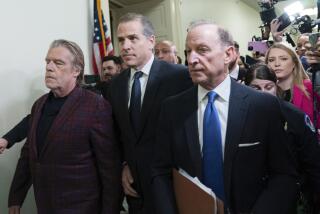Opinion: Twitter and Facebook are illegally helping the Biden campaign? Sorry, no

This may be the only time I ever say this, but it’s a good thing the Federal Election Commission can’t do anything.
Several Republicans have argued that Facebook and Twitter interfered with the presidential election by not letting their users freely share a New York Post expose alleging that Hunter Biden arranged a meeting between his father, then-Vice President Joe Biden, and an executive at the controversial Ukrainian energy company that had hired the younger Biden for its board of directors. The story was based on private emails and photos supposedly retrieved from a laptop allegedly abandoned by Hunter Biden at a Delaware computer repair shop that just happened to be owned by a strong supporter of President Trump.
The Republican National Committee filed an FEC complaint against Twitter last week, arguing that the company illegally contributed to Joe Biden’s presidential campaign by stopping Twitter users from posting links to the Post story. White House Chief of Staff Mark Meadows chimed in Monday, saying during an interview on Fox News that “additional lawsuits will be filed” in response to the actions by the two social media giants.
The core of the RNC’s argument is that Twitter violated the ban on corporations contributing directly to political campaigns. Twitter’s “suppression of the New York Post articles provides a thing of value to the Biden campaign,” the complaint alleges. The company “is acting as Biden’s media operative, taking proactive steps to shield Biden from negative news coverage by blocking its distribution and muzzling those who try. If [Twitter] charged for this service, Biden no doubt would gladly pay a significant price.”
By this logic, however, every action a company takes or does not take that helps one candidate or hurts another could be considered an illegal campaign contribution. And that’s not just unsustainable, it’s nuts. And despite the complaints about the actions by Twitter and Facebook, the Post story still attracted a sizable audience and prompted a robust discussion — on Twitter and Facebook.
For some help on this, I reached out to Ann Ravel, a former chair of California’s Fair Political Practices Commission and a former member of the FEC. Yes, Ravel is a Democrat, but that means she thinks federal election law should actually be enforced. The Trump administration has left so many seats on the commission unfilled that its members cannot even meet.
Ravel said that although the FEC has never specifically defined a “thing of value,” there’s no shortage of advisory opinions clarifying that it means something that’s directly provided to a campaign for a campaign-related purpose. For example, she said, a company digging up dirt on Candidate X in order to give the material to X’s opponent would be providing a thing of value to said opponent.
By contrast, Twitter and Facebook were just enforcing their rules, Ravel said. Although Republicans might think that the actions helped Biden, she added, they were not “done for the purpose of providing benefit to one candidate or another.” In other words, Twitter and Facebook didn’t cobble together some special procedures to promote Biden’s candidacy. They did what they’ve done multiple times when users run afoul of the policies they’ve posted on their sites.
Twitter barred users from posting links to two Post stories because they violated two rules the company has had in place for some time: The story included images that disclosed Hunter Biden’s contact information without his consent (the sort of intrusion on privacy that Twitter tries to guard against) and it distributed “content obtained through hacking.” Trump supporters argue that the photos and emails purportedly extracted from the laptop were fair game because the laptop was said to have been abandoned. But to believe that, you have to consider Trump lawyer Rudy Giuliani, who peddled the story to the Post, to be a credible figure.
Facebook, meanwhile, said that it was concerned that the original Post story violated its rule against spreading “false news,” but it didn’t stop people from sharing it or any of the follow-ups. Instead, it said that the original piece would be reviewed by its fact-checkers, and in the meantime the social network would “temporarily reduce distribution” of it. That means it wouldn’t be amplified by Facebook as much as other pieces its users were sharing.
There are plenty of companies (particularly in and around the media business) that, like Twitter and Facebook, do things in the ordinary course of their operations that appear to benefit one candidate or one party over another. That isn’t and shouldn’t be problematic under campaign finance law unless the actions are done deliberately and primarily to provide a direct benefit to a campaign.
Consider, for example, the Post story itself, which Giuliani sought to get into print precisely because he thought it would help Trump’s campaign. By the RNC’s standard, publishing that story would be an illegal campaign contribution. More perversely, so would Fox News’ reported decision not to publish that story when Giuliani offered it.
As elections approach, countless companies urge the public to vote through public service announcements aimed at generating goodwill for their brands. By the RNC’s logic, such efforts could be seen as illegal campaign contributions because Democrats generally fare better as turnout increases. Newspapers offer endorsements of individual candidates and ballot measures as a way to sell more of their product. By the RNC’s measure, such endorsements would be illegal campaign contributions too.
To put this in context, bear in mind that Facebook has come under withering criticism from policymakers over the proliferation of misinformation on its platform. (Twitter too — and the pressure continues to this day.) So how effective were the steps Facebook took on the Post story? Not very. Here’s what Gizmodo’s Whitney Kimball reported Friday:
“A search on Facebook’s content discovery platform CrowdTangle shows that as of early Friday afternoon, the New York Post story has been shared over 470,000 times and has nearly 2 million interactions. Comparably, a New York Times article about Facebook and Twitter’s actions, also published Wednesday, has been shared on Facebook only 1,339 times. And a New York Post story, also published Wednesday, on the Amy Coney Barrett confirmation hearings, has been shared 46 times, as of this writing.”
(Feel free to insert your joke here about how many pieces I would have to write to have them shared, cumulatively, 470,000 times on Facebook.)
To sum up, what we saw last week was two giant social media platforms dealing with a story that, in their judgment, did or was likely to violate their terms of service, which they are being pressed hard by policymakers from both parties to enforce. But neither stopped its users from discussing the Post story; in fact, it’s conceivable that Twitter’s ban on linking led to more tweets about the Post’s allegations. If they were trying to help Biden, they didn’t do it very well.
More to Read
A cure for the common opinion
Get thought-provoking perspectives with our weekly newsletter.
You may occasionally receive promotional content from the Los Angeles Times.







